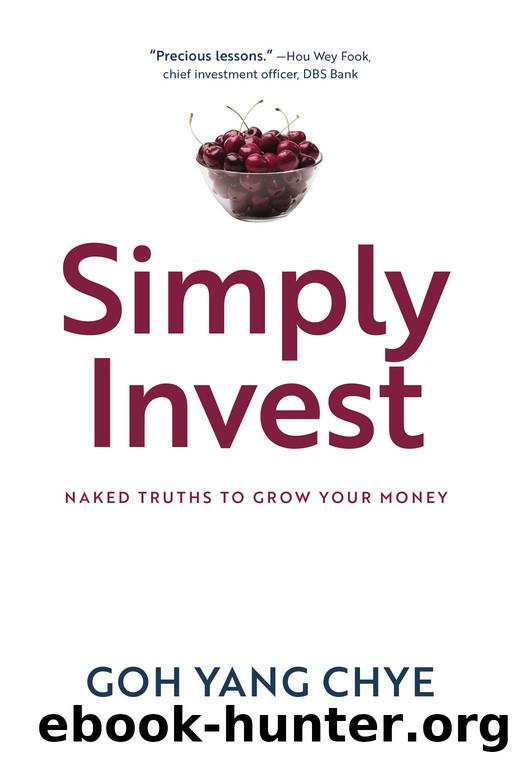Simply Invest by Goh Yang Chye

Author:Goh Yang Chye
Language: eng
Format: epub
ISBN: 978-981-47-8561-7
Publisher: Epigram Books
Published: 2019-05-28T16:00:00+00:00
Apart from locking in losses, panic selling during a crash also curbs massive potential gains. In an analysis by the University of Michigan on 31 years of market data, it was noted that only 1.15 per cent of trading days were responsible for generating 95 per cent of market returns. The important questions then is: when do these days fall? Well, another study by JP Morgan Asset Management found that six of the ten best days in the market occurred within two weeks of the ten worst days— in other words, shortly after a market crash!
This is all the more reason why it is a bad idea to get out of the market when prices are falling, at least for a long-term investor. There is a very high chance that you would end up missing a sudden upswing, one that would cost you more than whatever little you might manage to salvage from getting out of the market before it falls further.
So, for investors who still believe they might escape a market crash by timing it right, the data suggests that your portfolio would do much better if you just waited it out. If you are a long-term investor planning to hold your portfolio for 15 to 20 years, a bear market of three to six months cannot hurt you much, for you have many years in the market to gain your money back. The only way it can hurt your portfolio is if you allow it to by rushing to sell off your assets in a crash—which investors almost always do at the worst possible time. Conversely, if you stay calm and do nothing, the losses would remain on paper and never become realised, as the market will eventually bounce back.
This is a lot harder to do if most of your life savings are invested in the stock market, or if you need that money urgently. In such a scenario, it’s reasonable that you might be afraid that the markets will not recover by the time you need to liquidate your funds, leading to panicked attempts to get out before you lose even more.
As such, it is crucial to construct risk-appropriate portfolios and to be aware of how much you could stand to lose. Do not overstretch yourself and take on potential losses you will not be able to afford. If you are just about to retire after years of hard work and saving up, having that nest egg invested fully in equities is probably not a good idea.
Likewise, if you are investing funds that you will need in the short term, you should choose investment vehicles which can ensure that the money will be there and ready to be withdrawn should you need it. For instance, if you have $1,000 and will need it in a month’s time, you should put it in a savings deposit (or under your bed), rather than in the stock market.
Always be sure that your necessities are taken care of first and that you will be able to survive even in the absolute worst case market scenario.
Download
This site does not store any files on its server. We only index and link to content provided by other sites. Please contact the content providers to delete copyright contents if any and email us, we'll remove relevant links or contents immediately.
The Compound Effect by Darren Hardy(8919)
Tools of Titans by Timothy Ferriss(8360)
Nudge - Improving Decisions about Health, Wealth, and Happiness by Thaler Sunstein(7689)
Win Bigly by Scott Adams(7183)
Deep Work by Cal Newport(7057)
Rich Dad Poor Dad by Robert T. Kiyosaki(6596)
Principles: Life and Work by Ray Dalio(6404)
Pioneering Portfolio Management by David F. Swensen(6280)
Digital Minimalism by Cal Newport;(5745)
The Barefoot Investor by Scott Pape(5740)
Grit by Angela Duckworth(5593)
The Slight Edge by Jeff Olson(5406)
Discipline Equals Freedom by Jocko Willink(5373)
The Motivation Myth by Jeff Haden(5202)
You Are a Badass at Making Money by Jen Sincero(4912)
The Four Tendencies by Gretchen Rubin(4592)
Eat That Frog! by Brian Tracy(4513)
The Confidence Code by Katty Kay(4245)
Bullshit Jobs by David Graeber(4177)
